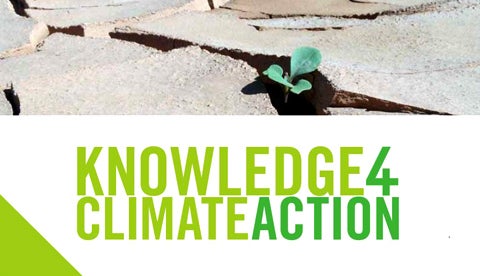For World Environment Day, Connect4Climate just released a new collection of ideas for invigorating climate action, drawn from the hundreds of you who attended our international workshop on climate action and from the leaders who inspire you.
Curbing climate change will take bold action – that's a given. What we wanted to learn from the Be the Movement workshop on the sidelines of UN climate talks in Warsaw was what we can all do to encourage bold action now.
Here’s a sneak peek at the outcome. You can read more in Knowledge4Climate Action, our new report on energizing the global movement for action to tackle climate change.
More than 500 participants identified and discussed five vital needs for the climate change movement: messaging for new audiences, empowering educators, innovating campaign strategies, considering costs, and leading for solutions. These 14 key recommendations emerged:
1. Increase collaboration and cooperation among climate change organizations, amplify existing climate initiatives, and seeking as much as possible to connect and coordinate all climate change efforts. David Cadman, president of ICLEI Local Governments for Sustainability, advised: "Start where you are! You know your network of friends, begin to engage them, ask them to engage their friends. … That’s where change really begins."
2. Stress the intimate and unavoidable link between eradicating extreme poverty and tackling climate change by both mitigating additional changes and adapting to climate impacts. Nick Nuttall, communications and outreach coordinator for the UNFCCC, said: "We need to move beyond GDP. We need to change the rules of the game. The rules are not working in favor of climate change."
3. Emphasize that early climate action now will be less expensive than dealing with the harmful impacts of climate change in the future. The IPCC reports show that the costs of preventing dangerous warming escalates the longer the world delays action.
4. Stress that mitigation policies will not impede economic development. Policies that support clean development, including a price on carbon, help create a more climate-resilient world while reducing the drivers of climate change.
5. Insist in all our campaigns and communications that each and every individual can make a difference in combating climate change by changing his or her behavior and behaviors of neighborhoods, communities, and cities. "This is about building a movement. You’re the movement. … every person can make a difference," said World Bank Group Vice President and Special Envoy for Climate Change Rachel Kyte.
6. Offer assistance in finding fact-based information and teaching guides that educators can use in the classroom. "Education is key to bring about urgently needed changes in the way we think and act for building low emission and climate resilient societies," said Moritz Weigel of the UNFCCC.
7. Find novel ways and creative messages to communicate to new audiences why climate change is important and must be addressed. Kelly Rigg, of the Varda Group and former executive director of Global Call for Climate Action, noted that around the world there are "climate heroes" who already have made their own communities more environmentally friendly. "We need to celebrate that and make that visible."
8. Encourage contacts with local and national policy makers so they are aware of their constituents’ concerns about climate change and their desire to find ways to mitigate it.
9. Initiate contacts with educators, who are key actors in driving climate action and spreading environmental awareness among youth, to encourage them to communicate the need to give climate change information to their students.
10. Increase efforts to partner with private sector leaders to implement sustainable and low-carbon practices in the business community. Stefan Maard from the biotech company Novozymes told the workshop that it is important to "make sure you have one voice on sustainability, including climate change, so that there is this revolution of capitalism that harmonizes financial and social needs."
11. Initiate contact with leaders of cities, which are well placed by their size and locations, to introduce climate change mitigation and adaptation strategies and thus provide good examples of climate change activism to other policy makers.
12. Prioritize the task of finding and communicating with new audiences who are not yet aware of climate change or do not have solutions, and proposing activities they can implement to reduce the impacts of climate change. Jamie Henn, co-founder of 350.org, underlined the "need to get more people onboard, and then together we can figure out the ways we can all take action."
13. Assist citizens, through education and organization, to feel empowered to address policy makers’ resistance to or rejection of climate change mitigation policies. Professor Zbigniew Kundzewicz of the University of Poznań and Potsdam Institute for Climate Impact Research said: "We can do a lot by changing our habits, by doing things that make sense anyway. It’s always good to save energy, to save water."
14. Organize more events that will include policy makers and new audiences that have not been invited in the past in order to advance the climate change message beyond those already aware of this global challenge. Climate Action Network Director Wael Hmaidan emphasized: "It’s important to start pushing change, and I think we will win."



Join the Conversation